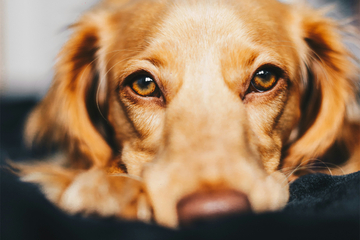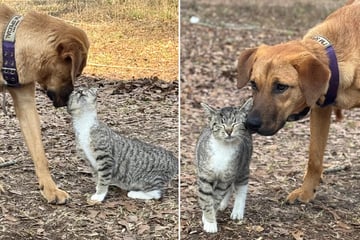When should I feed my dog?
Some dogs are fed once a day, others get breakfast and dinner, and portion sizes often change depending on the time of day. Is this how things really should be? When should I feed my dog, and when does it change?
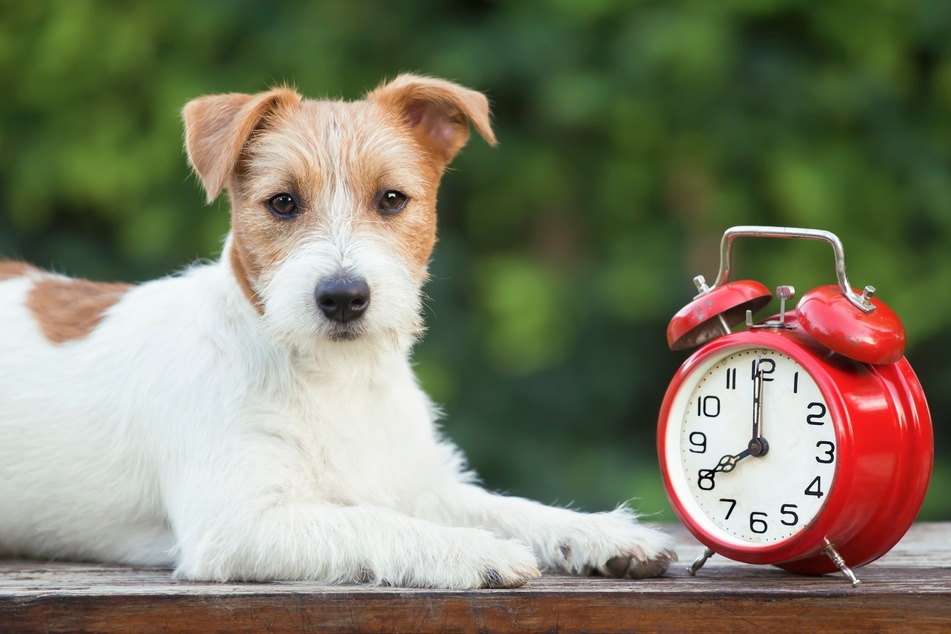
Dogs are extraordinary creatures, with equally extraordinary appetites. As with many people, most dogs look forward to dinner and get incredibly excited when they sniff out a bit of sausage, a nip of bacon, or a square of cheese.
Do our canine companions need to be fed as regularly as they often are, or is there a different solution to this age-old question?
So when should I feed my dog? At what times should your dog be given its meals, and will those times change based on its age, health, and habits? When meal time comes around, how much food should be provided?
When should I feed my dog: At what time of day?
No dogs would ever avoid or turn down a meal, making it incredibly important to control your darling doggo's diet and meal times. As a general rule, too frequent feeding can cause weight gain and health problems, and too irregular feeding can cause great discomfort and can even be neglectful in more extreme situations.
When thinking about when you should feed your dog, there are four main things that you need to think about. These include:
- Your daily routine: Your daily routine plays a big role in when it is convenient for you to feed your dog each day. Of course, your dog's schedule will have to fit into the way you live your life and the job you have.
- The age of your dog: In general, puppies do not need to eat as much as older dogs but should be fed multiple smaller servings every day. On the flip side, elderly dogs should eat more but less frequently.
- The breed and size of your dog: Different breeds will have different requirements, but this is a very specific question that can only really be answered by your veterinarian.
- Your doggo's state of health: Health can also impact upon your dog's daily diet. Different dietary requirements will be necessary for dogs with different health afflictions – again, this is something to discuss with the vet.
Every single dog will have a different routine and a different set of needs, so it doesn't really make sense to specify an exact time that your dog should be eating. That being said, we'd generally recommend a feed before you go to work in the morning, and again no later than 5 PM.
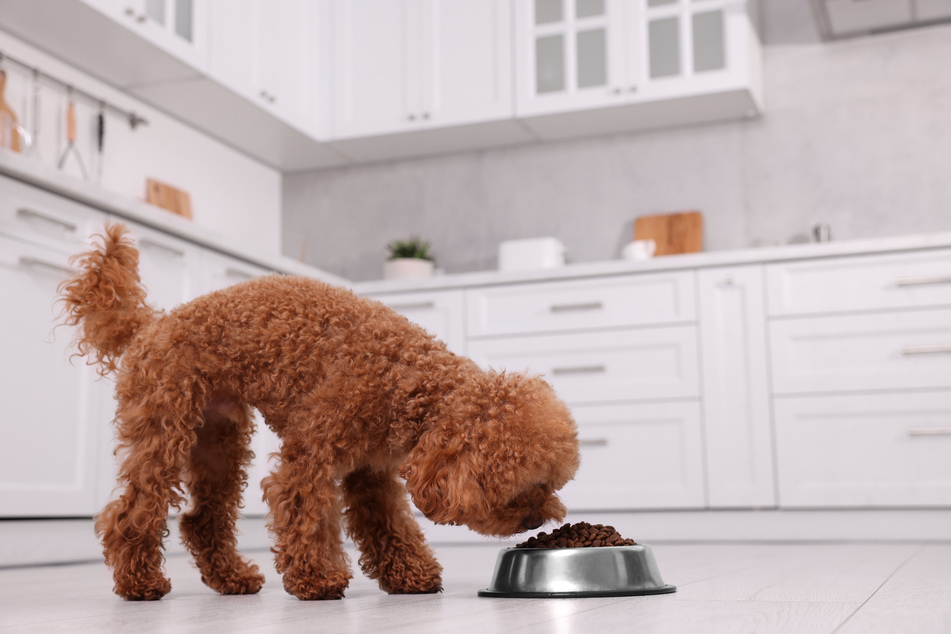
When should I feed my senior or sick dog?
Dogs who are a little bit older or are suffering from an issue with their health need to be provided with different quantities of food at different times. In these situations, there is only one thing to do – go to the veterinarian. You are not a medical professional and should not pretend to understand what your dog needs in these situations.
If you want your dog to make a swift recovery or live its final years on Earth in comfort, then the only person you should be asking is a vet. They will prescribe certain medications and a specific meal regime that will help keep them strong, provide them with the nutrients and vitamins they need, and make them feel a lot better.
In most cases, your dog will be given more food when it gets older or unwell (depending on the sickness, of course). This will be to help give it a nutritional boost to give it more energy and help it get through the rough times. Again, though, this changes dog by dog and case by case, so go to the vet before making any changes yourself.
How often to feed a dog

Your dog's daily feeding schedule will likely be a combination of what works best for you and your schedule and what's good for its health. Some owners work early shifts in the morning, while others work at night, so there's a lot of flexibility on when it would be best to feed your dog and how often.
Different dogs will often have very different requirements, with bigger dogs needing more regular and larger meals than smaller dogs. In general, though, it is suggested that your dog be given a proper meal only two times a day. This is very different from what many people do, which is to give their dog a meal whenever they personally have a meal.
It is believed by some that reducing a dog's meals to twice a day will have health benefits, which include a reduced risk of gastric torsion and a more regular supply of nutrients and energy. This is likely to do with the fact that while you are not overworking your dog's digestive system, you are giving it something to do on a more regular basis than if you limited it to a single meal per day.
By basing your decisions on quality advice from your veterinarian and simplifying things a bit more, you'll guarantee a dog that has improved concentration and less sensitive gastrointestinal tracks. The latter benefit is especially fantastic, as it will reduce the risk of health issues in the future.
Dogs should be fed whatever amount they need to stay strong and healthy, whenever is best for them. Don't do anything radical, but don't be neglectful either.
Please keep in mind: Every dog is different and will require feeding at different frequencies and different times. This is a rough guide of what to expect, but your veterinarian should be the one to provide such plans. After all, dogs with certain health issues will have certain needs.
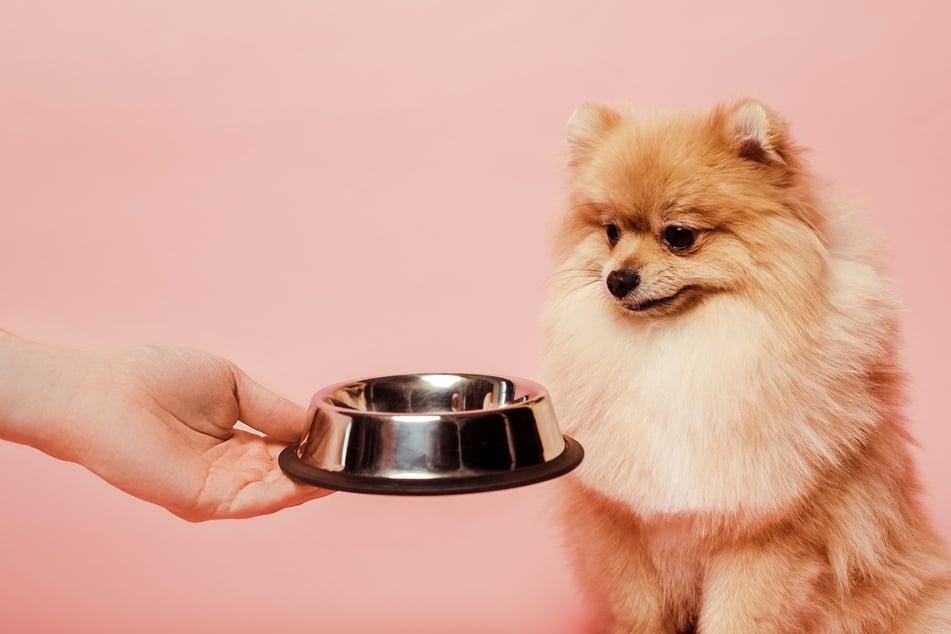
How much to feed a dog
You should never feed your dog more than your vet recommends. As a rule of thumb, most wet dog food is provided in designated portions, making each tin its own meal. When it comes to dry food, though, it quickly gets more complicated, and the answer truly depends on the diet you intend your darling doggo to have.
Every aspect of what we've discussed here today entirely depends on your veterinarian's call, not on your sensibilities or the preferences of your hungry hound. Your vet will likely tell you to provide it with a set weight or volume of dry food per day, usually available for consumption at all times as a snack, as well as a series of pre-determined meals.
The most common system, though, is to have two "meals" a day, as well as a certain amount of treats or dry food. This does, however, depend on a number of factors that only your veterinarian can speak to.
Important: Water is utterly harmless but extremely harmful if not provided to the fullest. As a result, we want to reiterate that it is vitally important for you to provide a constant supply of water to your darling doggo.
Feeding your dog properly is important
If you want your dog to have a long and healthy life, you need to make sure that you have put an emphasis on keeping its meals minimal and its food good. Obesity in dogs is often caused by meal times being uncertain, at the wrong time of day, and far too large in quantity. By controlling these factors, as well as the diet itself, you'll keep your dog happy and strong.
Be very careful about what you feed your dog, how often, and when. If you are uncertain, then there's one place you should go – the veterinarian. It's always better to be cautious and safe than sorry.
Cover photo: 123RF/Reddogs
